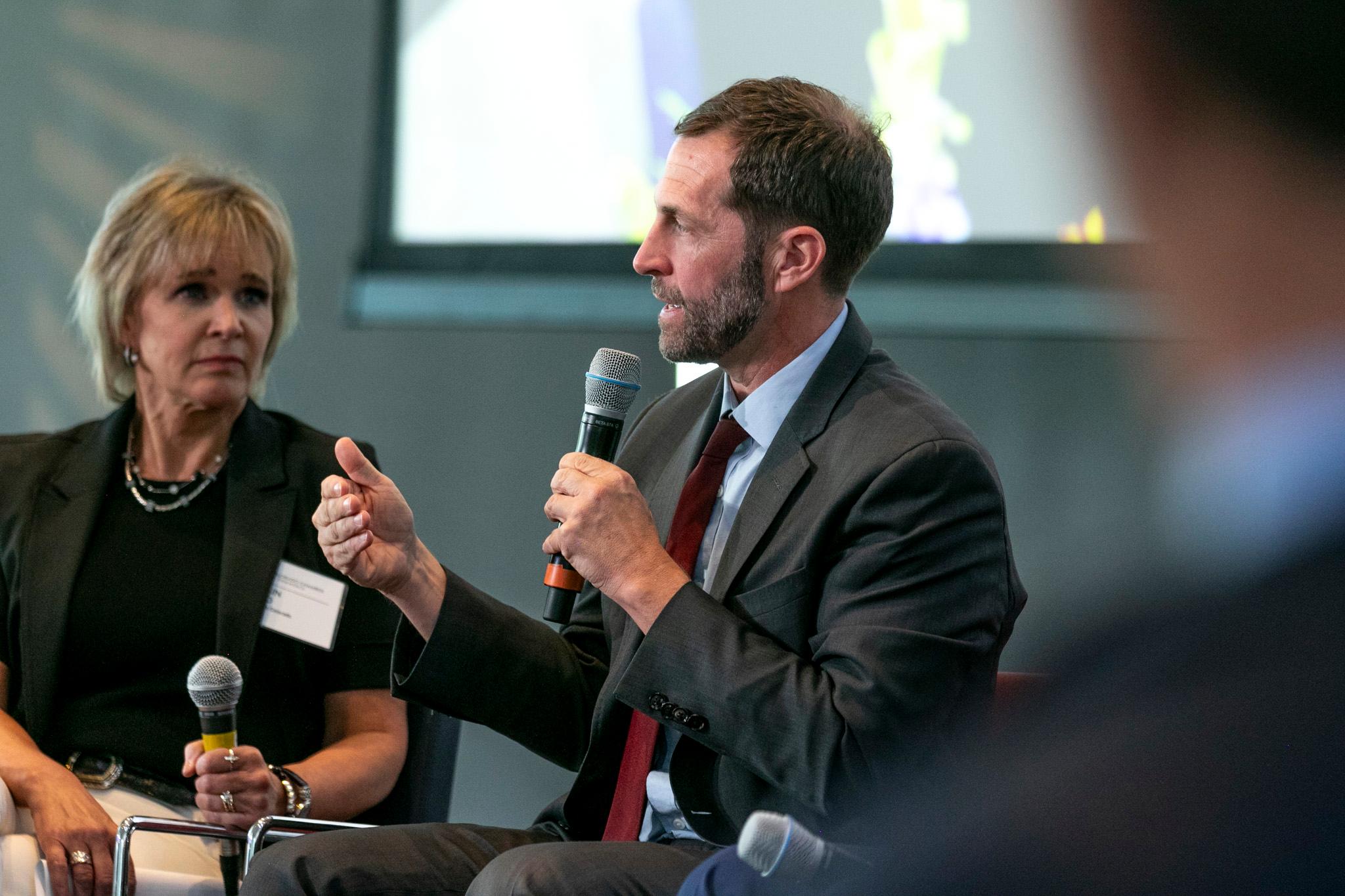
Jason Crow says potential disruptions to the nation’s air travel should not be the impetus to end the government shutdown.
“Everyone's like, ‘Well, why don't Democrats work in good faith? Why don't Democrats open the government?’” Crow, the Democratic representative for Colorado’s Sixth Congressional District, told Colorado Matters senior host Ryan Warner. “We have been; in April, we passed a CR (Continuing Resolution) to fund the government. The administration made promises to the Senate. The Senate took their word for it anyhow and look what's happened in that time, all of the reliance, all the promises have been broken. They had the chance to negotiate with us in April and in May and in June and in July and in August and in September, you get the idea.”
The Trump administration said there will be a ten percent reduction to air traffic beginning Friday if the shutdown continues. Now in its sixth week, Democrats have insisted that existing subsidies to offset the cost of health care be included in the next continuing resolution in order to receive their votes to reopen the government. Republicans have countered that they’d be willing to address that request after reopening.
United Airlines CEO Scott Kirby said recently that the shutdown is putting the American workers and the economy at risk and specific issues like health care should be addressed after the government reopens. Asked if a voice besides a Republican carried more influence with him, Crow said the answer would be the same,
“This is their crisis; they have made this,” Crow said. “Now, we have a responsibility to be willing to meet them in good faith, negotiate a compromise, because ultimately by policy we have to find a policy compromise, but they have to be willing to open the doors and start those discussions because we have repeatedly tried to do it.
“I'm sitting here in Washington right now ready to do it, and the Republicans are not here. So it starts with them exercising their responsibility in the way that we have been exercising ours”
In a wide-ranging interview, Crow also discussed ICE enforcement in Colorado and nationally, as well as the duty of troops who are being deployed to U.S. cities, his demand for transparency around lethal strikes on suspected drug-smuggling boats in international waters, and, in the face of gains nationally by the Democratic Party in this week’s elections, the importance of not discounting results from smaller, local races.
The following has been lightly edited for length and clarity.
Ryan Warner: Denver International Airport, along with others are seeing a ten percent reduction in flights, DIA is actually asking the feds if it can pay air traffic controllers out of its own pockets. Would holiday travel disruptions move Democrats away from their push to address health insurance costs before reopening government?
Rep. Jason Crow: Ryan, I'm not going to bargain with people's health insurance and their ability to actually survive and provide health care for their children. Every parent knows everything begins and ends with the health of your children, the health of your family. That is essential to everybody's life. And on top of that, what we've seen the Trump administration do is weaponize hunger against Americans, weaponize our military against Americans, weaponize the Department of Justice against their political enemies. We have a president that is acting way outside of the normal bounds of the law, of the constitution, of our morality as a nation, and they have made that decision and they are acting that way and that is non-negotiable for me. So this is not our shutdown. They have made the decision to act in the way they've acted. They made the decision to shut Congress down. They made the decision to not come to us to work towards a bipartisan solution, and they have to now make the decision to open the doors back up, start negotiation and work with us in good faith.
Warner: There has been some talk that Republican leaders would pick up the health care discussion if Democrats agreed to reopen the government. Is that not a promise or an offer that you have faith in?
Rep. Row: Why would I have faith in that, Ryan? What about the last 10 months and the actions of Donald Trump in this administration would get me to trust them? They have lied repeatedly. They have pulled the rug out from us repeatedly. They have no trepidation whatsoever, none in violating the law, violating the constitution, saying and doing terrible things against their perceived political enemies, weaponizing every faction of the government, trying to suppress free speech and our fundamental freedoms, sending mass federal agents onto our streets to snatch American citizens and provide no due process to these folks. What about any of that would lead me as a leader, as an elected official with a sworn oath to my constituents, to Colorado and to the constitution to believe that I could trust this man and this administration?
Warner: Congressman, United has an enormous presence in Colorado. No doubt many airline employees live in your district, which includes Aurora next door to DIA. The CEO of United, Scott Kirby, in a press conference with the vice president implored Congress to reopen the government and then debate health care costs. Let's listen just briefly.
Scott Kirby, United CEO: “As every day goes by, the impacts start to grow and airlines are a pretty good real-time indicator of the economy and we start to see, still minor, but steep booking impact and you see that happening in the economy. We put the whole economy at risk and so it's been 30 days and while I don't have a position on which partisan side and how things should be settled with health care, it has been 30 days. I also think it is time to pass a clean CR, use that as the opportunity to get into a room behind closed doors and negotiate hard on the real and substantive issues that the American people want our politicians on both sides of the aisle to solve. But let's get a clean CR and get that negotiation done behind closed doors without putting the American workers in the American economy at risk.”
Alright, that's not Donald Trump, that's the head of an airline that's very important to your state. Does the message coming from him differ?
Rep. Crow: Well, listen, this is the same answer, Ryan. Everyone's like, well, why don't Democrats work in good faith? Why don't Democrats open the government? We have been. In April, we passed a CR to fund the government. The administration made promises to the Senate. The Senate took their word for it anyhow, and look what's happened in that time, right? All of the reliance, all the promises have been broken. They had the chance to negotiate with us in April and in May and in June and in July and in August and in September, you get the idea. They are the ones that decided to recess that House of Representatives. Donald Trump is the one that went on Fox and Friends and said, Don't work with the Democrats. We're going to go this alone. Don't even talk to them. Donald Trump is the one that canceled the meeting with democratic leaders and said, I'm not going to discuss with them or negotiate with them. This is their crisis. They have made this. Now we have a responsibility to be willing to meet them in good faith, negotiate a compromise, because ultimately by policy we have to find a policy compromise, but they have to be willing to open the doors and start those discussions because we have repeatedly tried to do it. And I'm sitting here in Washington right now ready to do it, and the Republicans are not here. So it starts with them exercising their responsibility and the way that we have been exercising ours.
Warner: You've talked about this administration weaponizing any number of things, the military, ICE, the Department of Justice. You represent Aurora, which has a substantial immigrant community, and I'm curious what constituent services look like for your office now with intensification of ICE enforcement?
Rep. Crow: Yeah. Our office is being deluged with very, very challenging casework and outreach from our constituents. The Muslim ban has resulted in many families in the metro area, the Denver metro area, not being able to reunite their families, not being able to bring their families together and travel. We have seen countless incidents of people being snatched off streets, ICE agents and CBP and others showing up in places where they shouldn't. The fear and intimidation that we are dealing with within the district, but within the greater metro area is really astonishing, and that's why my obligation to make sure I'm standing by my constituents, that we are helping them as much as we can, that we are providing people with information about their rights and providing a safe space for people is so essential right now. You know that I'm proud of the fact that I represent one of the most diverse districts in the nation. We are a district in so many ways of immigrants and refugees. That's a lifeblood of our economy and we're seeing the impact on our families, on our economy and on the core of our community.
Warner: You mentioned CBP, Customs and Border Protection. Do you know any of your own constituents who have status here who perhaps are citizens who have been arrested by ICE? Can you speak to that specifically for the Sixth Congressional District?
Rep. Crow: I can't speak about individual cases because we treat those with confidence, but –
Warner: Do they exist? Do those cases exist in your district?
Rep. Crow: We believe that they do. There have been over a hundred, but what I do know is there have been over a hundred incidents around the country of U.S. citizens that have been snatched off of the street by immigration officials that have been denied due process. That is a problem nationwide.
Warner: And you have an understanding that some of those may have touched your district.
Rep. Crow: That is our understanding.
Warner: Okay, thanks for that. Californians approved a ballot measure allowing the state to redistrict and reshape five congressional districts that ostensibly would go to Democrats. And this is in response to Texas, Missouri, and North Carolina's moves due to the same for Republican gains. Do you think Colorado law should change to allow for something similar here?
Rep. Crow: Yeah, I do actually. And then I say that not lightly because I'm somebody that believes that campaign finance reform and ending gerrymandering are two of the most important things that we have to do to protect our democracy, and we have done it. I fought for it. I have bills that would help end it. I was one of the original sponsors of the Protecting Our Democracy Act. In fact, Democrats, when this has been put up for a vote in the United States Congress, overwhelmingly, actually unanimously, every single Democrat in the House of Representatives the last time this was voted on, voted for a federal prohibition on gerrymandering and every single Republican voted against it. So we have repeatedly tried to do this in a nationwide basis, but the abuse and the assault in our democracy by this administration and their attempt to try to stack the deck in their favor going into the election season, I am not going to sit around and watch that just happen on my watch and go and do a battle with one arm tied behind my back. I'm not going to do it. And then when we regain power, I actually believe the first thing we have to do is we have to put the guardrails back in place and in some instances, put guardrails that have never been in place for our democracy to make sure that we end gerrymandering nationwide, that we reform our campaign finance system and we go to the root of the issues that have undermined our democracy and delivered Donald Trump to the White House.
Warner: A question for you as an army ranger: Are troops violating their oaths to the constitution when they engage in domestic law enforcement at the president's request?
Rep. Crow: No, that's not the way I would look at it. Every soldier, every sailor, every marine, every airman has an obligation to uphold the constitution, right, and to follow lawful orders. So long as orders are lawful, they have an obligation to follow those, but if an order is unlawful, they have an obligation not to follow that.
Warner: Except of course the interpretation of the constitution depends on the day and the court.
Rep. Crow: Well, that's not necessarily true, right? You have to exercise your judgment. You have to actually know the constitution and the law, and you have to make that decision often on the spot. When I was an officer and I was deployed in Iraq and Afghanistan, we had to make decisions all the time about how to act in a certain situation, what was compliant with international humanitarian law, what was compliant with the law of armed conflict. You are educated and exposed to your legal requirements as part of your military training.
Warner: So whether it's Washington or Chicago or Portland, Oregon, you don't think the president has yet asked anything unconstitutional of troops?
Rep. Crow: I think the president has exceeded his authority and I think he has acted outside of that legal authority, and I've spoken as much. That's a different analysis though, Ryan, whether or not the troops themselves have been asked to violate the law or constitution, there's two levels of analysis.
Warner: It feels like splitting hairs. In other words, if you think that the president is acting outside the law and using troops as a pawn for it, isn't that the same question?
Rep. Crow: There are different questions. I mean, I see your point and I see the gray zone between the actions of the President and whether or not he's acting in and outside of his authority versus the operational and tactical responsibility of an individual troop.
Warner: You have signed a letter to the administration, demanding transparency around lethal strikes on suspected drug smuggling boats. You and others want a classified briefing as members of the Armed Services Committee on how “individuals and vessels are identified and what post-strike reviews are in place.” Congressman Crow, what are your fears here?
Rep. Crow: Well, my fear is that this is a classic example of the president acting outside of his authority without Congress declaring a conflict and the president acting as if there is a conflict. Right? When I sat in a briefing just a couple of weeks ago, they used terms like combatants and non-combatants when they were talking about the folks who have been targeted by these operations. That is the terminology of war. That is acting as if there has been a declaration of war when there hasn't, and only Congress can make a declaration of war. That's the first piece. The second is, this administration does not appear to have learned anything from our last 25 years of war in Iraq and Afghanistan. This country spent $3 trillion, 7,000 American lives, tens of thousands of other lives, 3 million combat tours, and most of those wars have ended poorly for this country, and the burden of those wars have been borne disproportionately by the American working class and folks in rural communities.
So having spent three combat tours in Iraq and Afghanistan, I myself harbor a lot of the anger and the resentment of working class folks around this nation for having been lied to and misled for two decades. And the same thing appears to be happening now. There is no problem that this president has seen that he doesn't think he can bomb his way out of, whether you're talking about Iran or the Houthis or now the Caribbean or now Nigeria.
The third thing that really bothers me is that there actually isn't a strategy to address the flow of drugs into this country. That does need to happen. Fentanyl has devastated our communities and killed tens of thousands of our children, and we deserve a real strategy to address the flow of drugs, and that means addressing the demand within the United States and educating parents, educating children and the flow. And there's actually nothing that has been relayed to me in any of my briefings that show this president, this administration, actually have a real strategy to address the flow of drugs. They simply are just blowing up and spending exorbitant resources doing so, blowing up a handful of speedboats and wooden rafts, posting videos of that and thinking that that will satisfy folks.
Warner: Just two bits of pushback. You paint the president as something of a war monger, but this is a dude who helped broker peace between Israel and Gaza. So square that for me first.
Rep. Crow: Well, I do believe that peace in Israel and Gaza and the West Bank and other places is important, and the ceasefire and the peace that is holding on very tenuously is actually a positive thing. Now, this president treated it as a transactional business deal. He is interested in striking real estate deals, not actually achieving peace. He's interested in the transactional elements of this, and already there are business deals that the administration and people associated with the administration are pursuing in this region. So that was their real motivation. But yeah, absolutely. Donald Trump campaigned and spoke like an isolationist and he is acting like an imperialist. In the first 10 months of this administration, we have seen a drastic expansion of conflict and military operations conducted by the U.S. military, and on top of it, he continues to saber rattle and talk about regime change in Venezuela. So there's no squaring of the circle that needs to happen. There is a very clear pattern of interventionists and the use of the military and drastic expansion of the use of our military over the last 10 months.
Warner: And then isn't the fight against fentanyl and other illicit drugs, isn’t that core to the administration's view of immigration enforcement? It seems hard to say that that's not a priority for Trump.
Rep. Crow: Yeah, it's not actually. What's core to their immigration enforcement is actually fear and intimidation and showing power. That's what they're trying to do. They're trying to strike fear and intimidate people throughout the country and use this new federal law enforcement force that they're building with $140 billion that house Republicans pushed through this summer to create a law enforcement agency that will do whatever Donald Trump asks them to do. That is what they're trying to do, and here's why I know that, Ryan: If this administration actually was serious about stopping fentanyl, why is there no evidence of any of these strikes in the Caribbean actually having been focused on fentanyl? There isn't, and this is a very important fact.
Warner: Election night this week was pretty rosy for Democrats, and I wonder what you take away that perhaps gets applied to 2026 and beyond.
Rep. Crow: The takeaway, which was overwhelming, is that America is repudiating Donald Trump and Trumpism. People are hurting, costs are going up. Health care is skyrocketing thanks to Donald Trump's mega bill in July. People see the chaos. They see the dysfunction, they see the destruction of critical government services in their everyday lives, and then they want leadership and they want government to work for them. We won in Virginia and New Jersey. Two of my closest friends are now going to be the governors of those states. But even more telling than those state races is what happened in city councils and mayor races and local legislatures and local judgeships around the country. And let's look at my own district where the Aurora City Council flipped, where Centennial flipped at both the city council and the mayor's level. For the first time in a very, very long time. There is something very significant happening and a massive movement afoot in America because people have had enough of the vitriol and the dysfunction.
Now it's our responsibility and my responsibility not to take that for granted. America sent a very strong message. They want something different. Now we have to meet the moment and we have to show that something different and what our positive vision is, and that is my work. That's what I'm doing around the country and around Colorado right now. I am recruiting the next generation of Democratic leaders to step up and to take office. I'm the chair of recruitment for the House Democrats, and I'm taking that responsibility seriously because this is about finding servant leaders, real genuine leaders who will step up, run races, flip districts, and move our country in a better direction.
Warner: I mean, recruitment is so key, but so is the idea of a face, a kind of a Trump for the left or an Obama or someone who gets the attention and drives people to volunteerism and to participation, and frankly to the polls. Is there a vacuum right now for Democrats?
Rep. Crow: We're going to have that. We lost the election across the board in November. So this party is going through the necessary process of sorting through our leadership, and when we go into the presidential cycle, we're going to see who can rise to the occasion and get that job done. And we can't anoint somebody. There can't be an heir apparent. People need to be able to show that they can do that job, and that is a healthy and necessary process. I don't shy away from that at all. But in the meantime, I reject the idea that there needs to be some figurehead leader at the top right now, today, for us to win districts around the country in Nebraska, in Ohio, in western Wisconsin, and upstate New York. Those folks are laser focused on the issues, like lead in the drinking water education, the cost of living, local infrastructure projects. We don't need a leader at the top right now, between now and November of 2026, to win in tough red areas of the country and to retake the house majority. What we need are great candidates who are going to run very local races with a proven track record of service that can make the compelling case and connect with their local voters. That is how you win those races.









